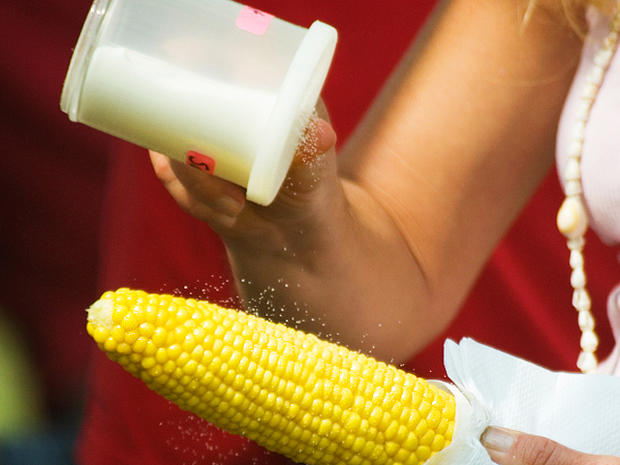High-sodium, low-potassium, a risky combo for heart
(CBS/AP) Too much salt? Bad. Not enough potassium? Bad. Too much salt and not enough potassium? Even worse.
That's the finding from the first federal study to research the relationship among salt, potassium, and heart disease deaths.
"If you have too much sodium and too little potassium, it's worse than either one on its own," said Dr. Thomas Farley, New York City's health commissioner in a commentary published with the study in Monday's Archives of Internal Medicine.
The research found people who eat a lot of salt and little potassium were more than twice as likely to die from a heart attack as those who ate about equal amounts of both nutrients. This dietary imbalance poses a greater risk than simply eating too much salt, the study suggests.
Potassium may neutralize the heart-damaging effects of salt, said study author Dr. Elena Kuklina, a nutritional epidemiologist for the Centers for Disease Control and Prevention. Too much sodium increases the risk of high blood pressure - a major cause of heart disease and stroke.
Health officials say no one should eat more than 2,300 milligrams of sodium a day, equal to about a teaspoon of salt. Certain people, such as those with high blood pressure, should eat even less. But only one in 10 Americans meet the teaspoon guideline.
Americans aren't much better at getting enough potassium. The recommended amount is 4,700 milligrams a day. The average woman gets only about half that; the average man gets slightly more. Spinach, bananas, broccoli and prunes are among the foods known as good potassium sources.
For the study, researchers surveyed more than 12,000 U.S. adults ages 20 and older, asking them what they ate the previous day, and calculating their daily consumption of sodium and potassium. The participants were followed for 14 years, and 433 died from heart attacks.
In addition to the heart disease risks from the sodium-potassium relationship, the study also found ill effects from high sodium alone. People who consumed 5 grams a day had nearly twice the risk of dying from a heart attack as people who ate 2 grams a day during the follow-up period.While this study is interesting, it is also limited - that day may not have been typical of the participants' diets and it may not be representative of their diet in the years since, noted Dr. Robert Eckel, a University of Colorado heart expert. Also, the study is observational and shows an apparent link, not a cause and effect.
Exactly how potassium and salt interact is not understood, and no one believes that simply taking a potassium pill will protect someone against the dangers of a high-salt diet. Instead, the take-home message is what health officials have been saying for years: Eat a lot of fresh fruits, vegetables and other potassium-rich foods, and eat less salty, processed foods.
